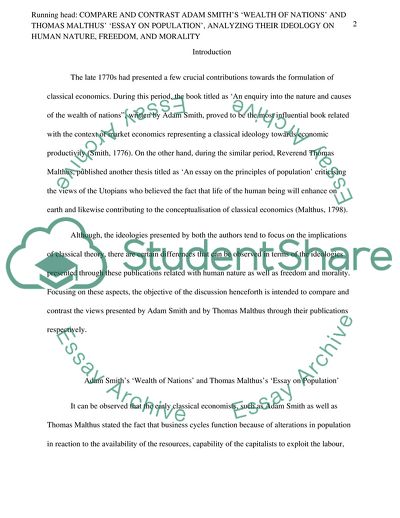Cite this document
(Comparison of Adam Smiths Wealth of Nations and Thomas Malthus Essay Term Paper - 1, n.d.)
Comparison of Adam Smiths Wealth of Nations and Thomas Malthus Essay Term Paper - 1. Retrieved from https://studentshare.org/philosophy/1778342-compare-and-contrast-adam-smith-wealth-of-nations-and-thomas-malthus-essay-on-population-analyzing-their-ideology-on-human-nature-freedom-and-morality
Comparison of Adam Smiths Wealth of Nations and Thomas Malthus Essay Term Paper - 1. Retrieved from https://studentshare.org/philosophy/1778342-compare-and-contrast-adam-smith-wealth-of-nations-and-thomas-malthus-essay-on-population-analyzing-their-ideology-on-human-nature-freedom-and-morality
(Comparison of Adam Smiths Wealth of Nations and Thomas Malthus Essay Term Paper - 1)
Comparison of Adam Smiths Wealth of Nations and Thomas Malthus Essay Term Paper - 1. https://studentshare.org/philosophy/1778342-compare-and-contrast-adam-smith-wealth-of-nations-and-thomas-malthus-essay-on-population-analyzing-their-ideology-on-human-nature-freedom-and-morality.
Comparison of Adam Smiths Wealth of Nations and Thomas Malthus Essay Term Paper - 1. https://studentshare.org/philosophy/1778342-compare-and-contrast-adam-smith-wealth-of-nations-and-thomas-malthus-essay-on-population-analyzing-their-ideology-on-human-nature-freedom-and-morality.
“Comparison of Adam Smiths Wealth of Nations and Thomas Malthus Essay Term Paper - 1”, n.d. https://studentshare.org/philosophy/1778342-compare-and-contrast-adam-smith-wealth-of-nations-and-thomas-malthus-essay-on-population-analyzing-their-ideology-on-human-nature-freedom-and-morality.


